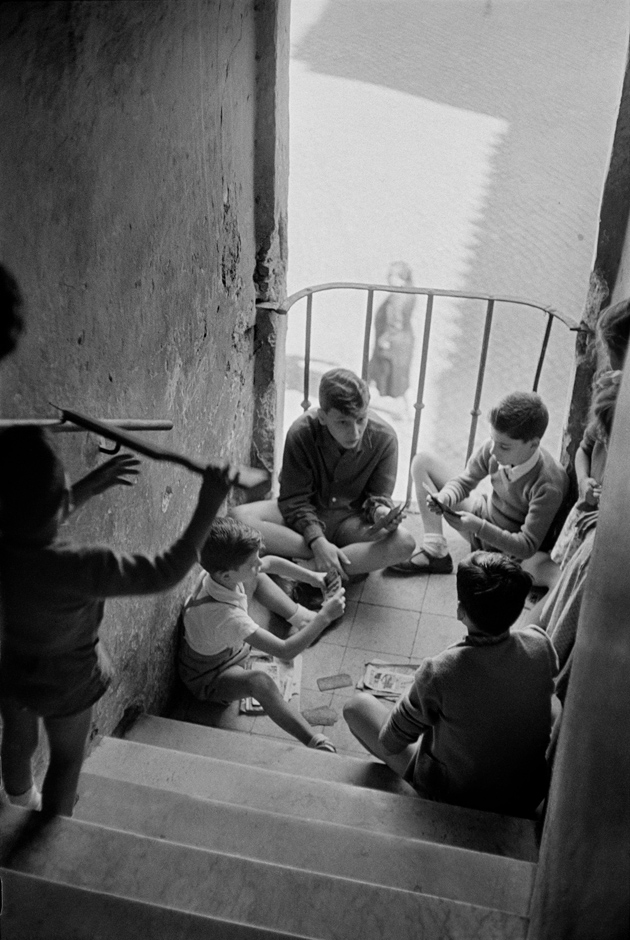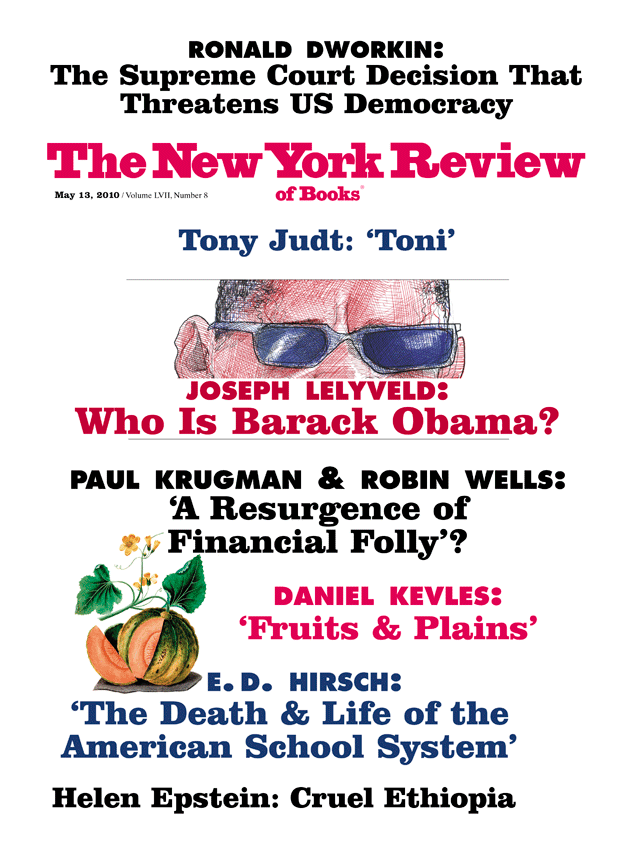
Henri Cartier-Bresson/Magnum Photos
Rome, 1952; from the exhibition ‘Henri Cartier-Bresson: The Modern Century,’ at the Museum of Modern Art, New York City, through June 28, 2010. For a slide show about the exhibition, narrated by Dominique Nabokov, see the NYR blog.
My wife earnestly instructs Chinese restaurants to deliver in cardboard cartons. My children are depressingly knowledgeable about climate change. Ours is an environmental family: by their standards, I am a prelapsarian relic from the age of ecological innocence. But who traipses through the apartment switching off lights and checking for leaking faucets? Who favors make-do-and-mend in an era of instant replacement? Who recycles leftovers and carefully preserves old wrapping paper? My sons nudge their friends: Dad grew up in poverty. Not at all, I correct them: I grew up in austerity.
After the war everything was in short supply. Churchill had mortgaged Great Britain and bankrupted the Treasury in order to defeat Hitler. Clothes were rationed until 1949, cheap and simple “utility furniture” until 1952, food until 1954. The rules were briefly suspended for the coronation of Elizabeth, in June 1953: everyone was allowed one extra pound of sugar and four ounces of margarine. But this exercise in supererogatory generosity served only to underscore the dreary regime of daily life.
To a child, rationing was part of the natural order. Indeed, long after the practice ceased, my mother convinced me that “sweets” (candy) were still restricted. When I protested that school friends appeared to have unlimited access to the stuff, she explained disapprovingly that their parents must be on the black market. Her story was all the more credible because the legacy of war was ever-present. London was pockmarked with bomb sites: where once there had been houses, streets, railway yards, or warehouses there were now large roped-off areas of dirt, usually with a dip in the middle where the bomb had fallen. By the early 1950s unexploded ordnance had been mostly cleared and bomb sites—though off-limits—were no longer dangerous. But these impromptu play spaces were irresistible for small boys.
Rationing and subsidies meant that the bare necessities of life were accessible to all. Courtesy of the postwar Labour government, children were entitled to a range of healthful products: free milk but also concentrated orange juice and cod-liver oil—obtainable only in pharmacies after you established your identity. The orange juice came in rectangular, medicine-like glass bottles and I have never quite lost the association. Even today, a large glassful prompts in me a sublimated pang of guilt: better not drink it all at once. Of cod-liver oil, urged upon housewives and mothers by benevolently intrusive authorities, the less said the better.
We were fortunate to lease an apartment above the hairdressing shop where my parents worked, but many of my friends lived in substandard or temporary housing. Every British government from 1945 through the mid-1960s committed itself to large-scale public housing schemes: all fell short. In the early 1950s, thousands of Londoners still lived in “prefabs”: urban trailer parks for the homeless, ostensibly temporary but often lasting for years.
Postwar guidelines for new housing were minimalist: three-bedroom houses were to comprise at least nine hundred square feet of living space—about the size of a spacious one-bedroom apartment in contemporary Manhattan. Looking back, these homes seem not merely pokey, but chilly and underfurnished. At the time, there were long waiting lists: owned and managed by local authorities, such houses were intensely desirable.
The air over the capital resembled a bad day in Beijing; coal was the fuel of choice—cheap, abundant, and domestically produced. Smog was a perennial hazard: I recall leaning out of the car window, my face enveloped in a dense yellow haze, instructing my father on his distance from the curb—you could literally not see beyond an arm’s length ahead of you and the smell was awful. But everyone “muddled through together”: Dunkirk and the Blitz were freely invoked without a hint of irony to illustrate a sense of national grit and Londoners’ capacity to “take it”—first Hitler, now this.
I grew up at least as familiar with World War I as with the one that had just ended. Veterans, memorials, and invocations abounded; but the ostentatious patriotism of contemporary American bellicosity was altogether absent. War, too, was austere: I had two uncles who fought with Montgomery’s Eighth Army from Africa through Italy and there was nothing nostalgic or triumphalist in their accounts of shortage, error, and incompetence. Arrogant music hall evocations of empire—
We don’t want to fight them, but by Jingo if we do,
We’ve got the ships, we’ve got the men, we’ve got the money too!
—had been replaced by the wartime radio lament of Vera Lynn: We’ll meet again, don’t know where, don’t know when. Even in the afterglow of victory, things would never be the same.
Advertisement
Reiterated references to the recent past established a bridge between my parents’ generation and my own. The world of the 1930s was with us still: George Orwell’s Road to Wigan Pier, J.B. Priestley’s Angel Pavement, and Arnold Bennett’s The Grim Smile of the Five Towns all spoke to an England very much present. Wherever you looked, there were affectionate allusions to imperial glory—India was “lost” a few months after I was born. Biscuit tins, pencil holders, schoolbooks, and cinema newsreels reminded us of who we were and what we had achieved. “We” is no mere grammatical convention: when Humphrey Jennings produced a documentary to celebrate the 1951 Festival of Britain, he called it Family Portrait. The family might have fallen on hard times, but we were all in it together.
It was this “togetherness” that made tolerable the characteristic shortages and grayness of postwar Britain. Of course, we weren’t really a family: if we were, then the wrong members—as Orwell had once noted—were still in charge. All the same, since the war the rich kept a prudently low profile. There was little evidence in those years of conspicuous consumption. Everyone looked the same and dressed in the same materials: worsted, flannel, or corduroy. People came in modest colors—brown, beige, gray—and lived remarkably similar lives. We schoolchildren accepted uniforms all the more readily because our parents too appeared in sartorial lockstep. In April 1947, the ever-dyspeptic Cyril Connolly wrote of our “drab clothes, our ration books and murder stories…. London [is] now the largest, saddest and dirtiest of great cities.”
Great Britain would eventually emerge from postwar penury—though with less panache and self-confidence than its European neighbors. For anyone whose memories go back no further than the later 1950s, “austerity” is an abstraction. Rationing and restrictions were gone, housing was available: the characteristic bleakness of postwar Britain was lifting. Even the smog was abating, now that coal had been replaced by electricity and cheap fuel oil.
Curiously, the escapist British cinema of the immediate postwar years—Spring in Park Lane (1948) or Maytime in Mayfair (1949), with Michael Wilding and Anna Neagle—had been replaced by hard-boiled “kitchen sink” dramas starring working-class lads played by Albert Finney or Alan Bates in gritty industrial settings: Saturday Night and Sunday Morning (1960) or A Kind of Loving (1962). But these films were set in the north, where austerity lingered. Watching them in London was like seeing one’s childhood played back across a time warp: in the south, by 1957, the Conservative Prime Minister Harold Macmillan could assure his listeners that most of them had “never had it so good.” He was right.
I don’t think I fully appreciated the impact of those early childhood years until quite recently. Looking back from our present vantage point, one sees more clearly the virtues of that bare-bones age. No one would welcome its return. But austerity was not just an economic condition: it aspired to a public ethic. Clement Attlee, the Labour prime minister from 1945 to 1951, had emerged—like Harry Truman—from the shadow of a charismatic war leader and embodied the reduced expectations of the age.
Churchill mockingly described him as a modest man “who has much to be modest about.” But it was Attlee who presided over the greatest age of reform in modern British history—comparable to the achievements of Lyndon Johnson two decades later but under far less auspicious circumstances. Like Truman, he lived and died parsimoniously—reaping scant material gain from a lifetime of public service. Attlee was an exemplary representative of the great age of middle-class Edwardian reformers: morally serious and a trifle austere. Who among our present leaders could make such a claim—or even understand it?
Moral seriousness in public life is like pornography: hard to define but you know it when you see it. It describes a coherence of intention and action, an ethic of political responsibility. All politics is the art of the possible. But art too has its ethic. If politicians were painters, with FDR as Titian and Churchill as Rubens, then Attlee would be the Vermeer of the profession: precise, restrained—and long undervalued. Bill Clinton might aspire to the heights of Salvador Dalí (and believe himself complimented by the comparison), Tony Blair to the standing—and cupidity—of Damien Hirst.
In the arts, moral seriousness speaks to an economy of form and aesthetic restraint: the world of The Bicycle Thief. I recently introduced our twelve-year-old son to François Truffaut’s 1959 classic Les Quatre Cents Coups (The 400 Blows). Of a generation raised on a diet of contemporary “message” cinema from The Day After Tomorrow through Avatar, he was stunned: “It’s spare. He does so much with so little.” Quite so. The wealth of resources we apply to entertainment serves only to shield us from the poverty of the product; likewise in politics, where ceaseless chatter and grandiloquent rhetoric mask a yawning emptiness.
Advertisement
The opposite of austerity is not prosperity but luxe et volupté. We have substituted endless commerce for public purpose, and expect no higher aspirations from our leaders. Sixty years after Churchill could offer only “blood, toil, tears and sweat,” our very own war president—notwithstanding the hyperventilated moralism of his rhetoric—could think of nothing more to ask of us in the wake of September 11, 2001, than to continue shopping. This impoverished view of community—the “togetherness” of consumption—is all we deserve from those who now govern us. If we want better rulers, we must learn to ask more from them and less for ourselves. A little austerity might be in order.


